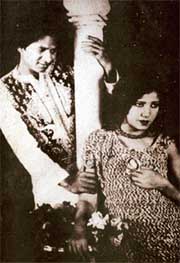Zubeida
| Zubeida (actress) | |
|---|---|

Master Vithal and Zubeida in Alam Ara, 1931.
|
|
| Born |
Zubeida Begum 1911 Surat, Bombay Presidency, British India |
| Died | September 1988 Bombay, Maharashtra, India |
| Occupation | Film actor |
| Years active | 1922-1949 |
| Spouse(s) | Maharaj Narsingir Dhanrajgir Gyan Bahadur |
| Children | Humayun Dhanrajgir (Son) Dhurreshwar Dhanrajgir (Daughter) |
Zubeida Begum Dhanrajgir (1911-1988) was an Indian film actress. She acted in the first Indian talkie movie Alam Ara (1931). Her credits include early hits Devdas (1937), and Sagar Movietone's first talkie, Meri Jaan.
She was among the few girls who entered films at a tender age during a time when it was not considered an appropriate profession for girls from respectable families, let alone Royalty. Born in Surat city of Gujarat in western India, Zubeida was a stunningly beautiful Muslim princess, the daughter of Nawab Sidi Ibrahim Muhammad Yakut Khan III of Sachin State and Fatima Begum. She had two sisters, Sultana and Shehzadi, both actresses.
Zubeida was only 12 when she made her debut in Kohinoor. Through the 1920s she made infrequent appearances on screen along with Sultana who, by then, had become one of Indian cinema's loveliest leading ladies. One of the films to star the two sisters was Kalyan Khajina in 1924. They had also shared the screen in Zubeida's first blockbuster, Veer Abhimanyu released two years earlier, that also had their mother, Fatima Begum, playing an important role.
In 1925 Zubeida had nine releases, amongst them Kala Chor, Devdasi and Desh Ka Dushman. A year later she starred in her mother's film, Bulbul-e-Paristan. 1927 was memorable for her with movies Laila Majnu, Nanand Bhojai and Naval Gandhi's Sacrifice which were very successful movies at this time. The latter, based on Rabindranath Tagore's 'Balidan', also starred Sulochana Devi, Master Vithal and Jal Khambatta. It condemned the age-old custom of animal sacrifice in certain Kali temples in Bengal. The Members of the Indian Cinematograph Committee were wowed by this "excellent and truly Indian film". Its European members recommended that it be sent abroad for screening.
...
Wikipedia
